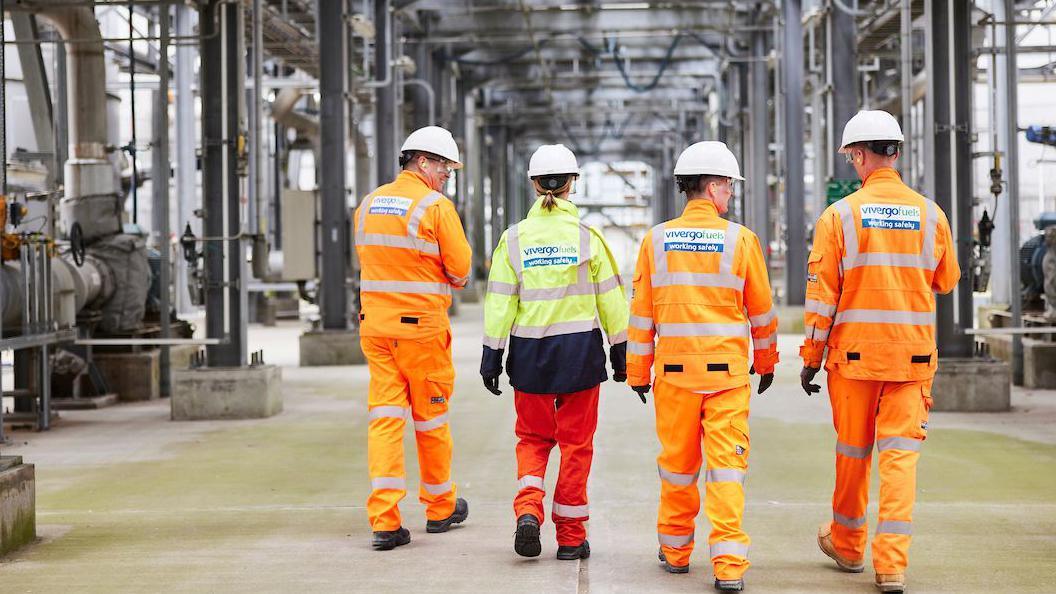Bioethanol layoffs to start next week after rescue ruled out

- Published
The UK's largest bioethanol plant will begin closing down operations on Monday, after the government decided not to offer the sector a rescue package.
Hull-based Vivergo Fuels, owned by Associated British Foods, told the BBC the first redundancies would take effect on Tuesday.
AB Foods and Ensus, which owns the UK's second large bioethanol plant in Redcar on Teesside, had both previously warned that without government support they would be forced to close, after a deal to allow US ethanol to be imported tariff-free.
The government said it had worked closely with the companies since June, but had decided it was not "in the national interest" to provide them with taxpayer funds.
The US-UK trade pact, agreed in May, removed a 19% tariff on ethanol imported from the US up to a quota of 1.4bn litres. That is approximately equivalent to the current size of the UK market and the firms claim the trade agreement had made their businesses "commercially unviable".
AB Foods said it had been in talks with the government over the last few months and had presented a plan to return the firm to profitability.
"In making this decision, the government has thrown away billions in potential growth in the Humber, a sovereign capability in clean fuels that had the chance to lead the world."
It said jobs in clean energy would now move overseas.
"This plant should always have been profitable under the right regulatory environment, as similar plants in western Europe demonstrate," the firm said.
German-owned Ensus has also been approached for comment.
The two plants employ 270 people, but their closure could affect thousands more in the supply chain.
Workers 'in limbo' as biofuel plant takes final delivery
- Published3 August
Threat to close biofuel plant after US tariff deal
- Published26 June
£1.25bn deal in doubt over Vivergo closure fears
- Published1 August
A government spokesperson said after working with the companies over weeks to understand "the financial challenges they have faced over the past decade", the government had taken the difficult decision not to offer direct funding "as it would not provide value for the taxpayer or solve the long-term problems the industry faces".
The government said it recognised this was a "difficult time for the workers and their families" and said it would work with trade unions, local partners and the companies to support those affected.
GMB union national officer Charlotte Brumpton-Childs said the trade deal was costing working people their livelihoods.
"They're not numbers in a spreadsheet. These are lives put on hold and communities potentially devastated," she said.
The government was also falling short on building a green energy strategy, she said.
"A clean energy industrial strategy means nothing if we cannot protects plants long enough to deliver clean energy jobs here in the UK."
Bioethanol is a fuel made from wheat, other grains or sugar beet. The US has provided subsidies and tax credits to corn farmers in midwestern states such as Iowa, Illinois and Nebraska, helping to hold down the price of its ethanol.
In the UK bioethanol is added to fuels such as E10 petrol. But sources within the sector said that government delays over the migration to petrol with higher bioethanol content had hurt the industry.
The government has previously said that by 2030 it wants 10% of all fuel used in planes to come from sustainable sources, one of which is bioethanol.
The bioethanol industry buys thousands of tonnes of wheat from UK farms, and Ensus also produces 30% of the UK's commercial carbon dioxide – used in soft drinks, medical and nuclear industries.
The government said it would continue to work on measures to ensure the resilience of the CO2 supply chain.
With additional reporting from Olivia Hutchinson